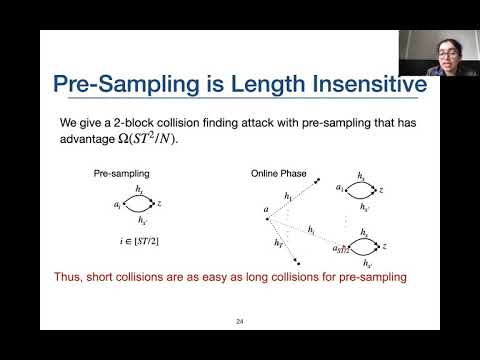CryptoDB
Time-Space Tradeoffs and Short Collisions in Merkle-Damgård Hash Functions
| Authors: |
|
|---|---|
| Download: |
|
| Presentation: | Slides |
| Conference: | CRYPTO 2020 |
| Abstract: | We study collision-finding against Merkle-Damgård hashing in the random-oracle model by adversaries with an arbitrary $S$-bit auxiliary advice input about the random oracle and $T$ queries. Recent work showed that such adversaries can find collisions (with respect to a random IV) with advantage $\Omega(ST^2/2^n)$, where $n$ is the output length, beating the birthday bound by a factor of $S$. These attacks were shown to be optimal. We observe that the collisions produced are very long, on the order $T$ blocks, which would limit their practical relevance. We prove several results related to improving these attacks to find short collisions. We first exhibit a simple attack for finding $B$-block-long collisions achieving advantage $\tilde{\Omega}(STB/2^n)$. We then study if this attack is optimal. We show that the prior technique based on the bit-fixing model (used for the $ST^2/2^n$ bound) provably cannot reach this bound, and towards a general result we prove there are qualitative jumps in the optimal attacks for finding length $1$, length $2$, and unbounded-length collisions. Namely, the optimal attacks achieve (up to logarithmic factors) order of $(S+T)/2^n$, $ST/2^n$ and $ST^2/2^n$ advantage. We also give an upper bound on the advantage of a restricted class of short-collision finding attacks via a new analysis on the growth of trees in random functional graphs that may be of independent interest. |
Video from CRYPTO 2020
BibTeX
@inproceedings{crypto-2020-30525,
title={Time-Space Tradeoffs and Short Collisions in Merkle-Damgård Hash Functions},
publisher={Springer-Verlag},
doi={10.1007/978-3-030-56784-2_6},
author={ Akshima and David Cash and Andrew Drucker and Hoeteck Wee},
year=2020
}

